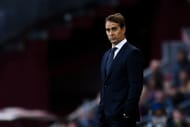Real Madrid had undergone massive changes over the summer. Zinedine Zidane decided to leave the club after winning three consecutive Champions League titles for his former club. Following the Frenchman's departure, Los Blancos' star player, Cristiano Ronaldo left for Turin to join Juventus on a transfer fees of £105.30m.
Real Madrid dealt with Zidane's departure by announcing the arrival of the then Spain National Team coach, Julen Lopetegui. But the 52-year-old was sacked by the Spanish Football Federation when they heard about his move to Real Madrid that would take place after the World Cup. They felt that the deal was done in bad faith and also felt a sense of betrayal as they were not aware of the deal until it was announced.
To bring in a manager in such a controversial manner put more pressure on Real Madrid to keep the fans happy with favourable results through the season.
The new coach made a bold decision as soon as he arrived. He decided to replace Cristiano Ronaldo with personnel within the club. Following a philosophy of developing players within the club, Lopetegui spent the big bucks in bringing in Brazilian wonder kid Vinicius Junior from Flamengo and right back Álvaro Odriozola from Real Sociedad.
The other significant transfers into the club were Thibaut Courtois from Chelsea and Mariano Diaz who was the successor to the great no.7 jersey worn previously by Cristiano Ronaldo.
Working with the Spanish National side, Lopetegui had a good knowledge of the wealth of Spanish players at his disposal. Perhaps this trust in the likes of Isco and Asensio stopped him from bringing in a big name signing to replace Ronaldo.
Despite a good relationship with the players, especially the captain, Sergio Ramos, Lopetegui had no real tactical edge over the previous managers and took time to really understand his best team.
Lopetegui's tactical flaws

Julen Lopetegui came from a Spain team that had a quick flowing possession-based football ingrained in them. He tried to implement the same in a Real Madrid side that had a completely different system.
Under Zidane, Real Madrid played a 4-3-3 formation with the recognisable front three of Benzema, Bale and Ronaldo. With a good physical presence from the three and Ronaldo's swift movements into goal-scoring areas, it was no surprise that Real Madrid played more directly. Whilst this was a risk as it heavily relied on Real Madrid's star players, it paid off as Los Blancos went on to win three consecutive European titles and four in five seasons.
The majority of Real Madrid's attacking threat under Zidane came from wing play, the attacking wing backs of Carvajal and Marcelo were able to get forward and help wingers, Ronaldo and Bale get crosses into the ball. Often on the end of these crosses would be Ronaldo or Benzema who are fairly good in the air. This high reliance on the two forwards is seen in their goal tally as they were the only two players in Real Madrid to reach double figures in LaLiga goals last season.
Lopetegui tried to remove the dynamic of depending on individual brilliance and tried to instead implement a system where the whole team attacked as a unit. The possession-based football that Lopetegui has played through his career was only possible with a high press.
The three forwards, often Asensio, Benzema and Bale pushed high and tried to win the ball as soon as they could. They were also joined by the midfield. However, the defensive line did not join the team which left a huge gap between the midfield and the defence - a gap exploited by the likes of Sevilla and Alaves who were able to transition in seconds.
Along with this gap, there was a huge lack of organisation up front. The three forwards were given a license to roam freely around the pitch and use their own intelligence while building forward. This often meant that Benzema would drop back to link with midfield and Asensio and Bale would support this link going forward, often exchanging flanks to do the same. But the lack of a true goal-scoring forward's presence in the box meant that this extensive build-up was often in vain.
Finally, Lopetegui was never able to decipher his best starting 11. While trying to experiment, Lopetegui tried a 4-3-3 or a 4-2-3-1 with various personnel. Except for the front three of Benzema, Bale and Asensio, Real Madrid never had a stable side.
Be it due to injuries, rotation or lack of trust, Lopetegui played a different 11 almost every game. From playing a tried and trusted midfield of Modric, Kroos and Casemiro to playing a midfield trio of Isco, Kroos and Ceballos, the starting team was always in a state of change.
The back four kept fluctuating as well with Ramos being the only constant. While Marcelo and Carvajal were the first-choice full-backs, Lopetegui had no real depth to fill the squad in their absence. His lack of trust in Odriozola meant that Nacho had to often play on either side of the back four. Nacho couldn't provide the same width and attacking threat a natural full-back would provide.
In conclusion, Lopetegui's return to club management ended in utter failure. Taking over a big club like Real Madrid was always going to be a big task. With the number of quality player in Real Madrid, man management is one of the biggest traits a manager arriving at Santiago Bernabeu must have.
A trait Lopetegui clearly did not have. This meant that the players didn't play for the manager which meant that any change Lopetegui would try to implement in the style of play would end in a fiasco.
The absence of Cristiano Ronaldo

While we have spent the majority of this article talking about how Lopetegui failed in bringing the dressing room together and implementing his tactics at Real Madrid, another major reason for the decline of Los Blancos is the departure of a certain marksman, Cristiano Ronaldo.
Cristiano Ronaldo played 438 games for Real Madrid and scored an astonishing 450 goals – that’s 1.02 goals per game – and makes him their all-time leading goalscorer. During his time at Real Madrid, Ronaldo won four Ballon D'ors and three golden boots.
The Portuguese international has also lead the Los Vikingos to their most trophied decade ever, winning 16 till now - 4 more than their previous highest of 12. Not only were his performances marvellous but also decided the game and took the opposition out as he scored 44 hattricks - 34 in LaLiga and 7 in the Champions League.
If we talk about the brilliance of Cristiano Ronaldo, we can go all day long. He has been the epitome of hard work since his debut and might even continue playing for the next 7-8 years. But how could Real Madrid cope with the departure of a figure so massive and so influential? the answer is they could not.
As Ronaldo left for Juventus, Real Madrid decided to replace him with the likes of Bale, Isco, Benzema and Asensio. While new signing, Mariano Diaz took the no.7 jersey, many Madridstas saw Asensio as the future of the club. But since then, Real Madrid have barely been able to recreate anything close to the phenomenon that is Cristiano Ronaldo.
In the 11 games that have taken place this season, Ronaldo has an xG (expected goals for) stat of 9.74 which is 5.56 more than the highest xG of Real Madrid from Karim Benzema with an xG of 4.18. The shots have also declined drastically. The highest shots per game ratio for Real Madrid this season is Gareth Bale with 4.6 shots per game. Ronaldo has taken 7.36 shots per game this season and averaged 6.9 shots per game last season with Real Madrid in LaLiga.
All this put together clearly shows that the absence of Cristiano Ronaldo has caused a huge void at Real Madrid. The pursuit of Eden Hazard and Neymar ended up collapsing this season but the interest might re-emerge in the Summer transfer window of 2019. But till then, Real Madrid will have to rely on their own youngsters - an approach that may see some success as it gives the opportunity for Asensio, Isco, Vinicius Jr and many more to rise to the scene.
